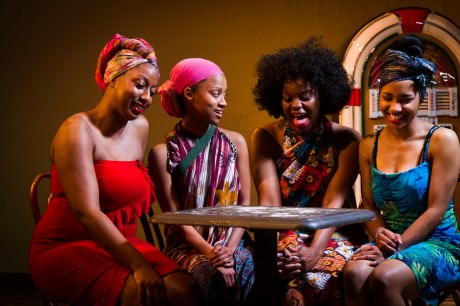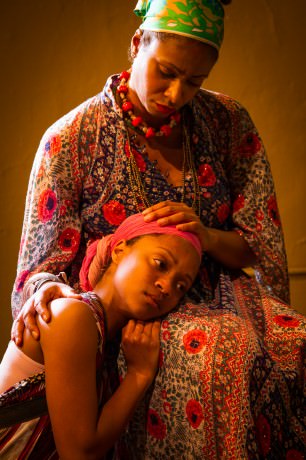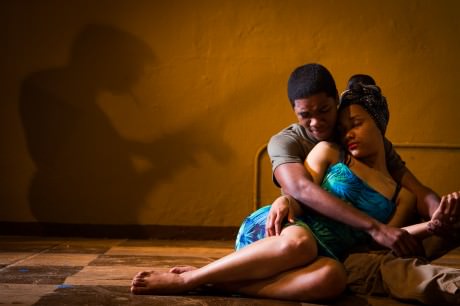The Pulitzer Prize-winning play Ruined by acclaimed playwright Lynn Nottage comes to life on the stage of Fells Point Corner Theatre as the final production in their 2011-2012 season. This haunting story captures the essence of life in modern day war-torn Democratic Republic of Congo. The play conquers the difficult notion of rape as a vehicle for terror; dissecting the lives of women who have lived through these acts of war terror and how there may still be hope in the end. It’s a harrowing tale executed beyond perfection – with the mournful emotional cries of talented performers expressing the anguish and sorrow such incidents inevitably cause.

There is a vast contrast between the tone of the play and how it is showcased in the costumes of the actors. Costume Designer Victoria Violet Jackson brings a vibrant bright feeling to the show keeping the women in an array of vivacious colors. Mama Nadi is always in warm oranges and yellows, the girls in eye-popping dresses of the sharpest reds and pinks or yellows and purples. Jackson’s contrasting decision helps to offset the repressing and encroaching feeling of doom and terror that comes inherently with the play. Set Designer Bush Greenbeck does the same for Mama Nadi’s watering hole, the main setting for the show. The walls are the color of sun-warmed clay and they hold a welcoming feel to them; creating the illusion that there is sanctuary and happiness within the walls and safety of this pleasure house. Together Jackson and Greenbeck liven up the play to keep the emotional distress proportionately balanced so it does not completely dominate the show.
Some of the most stunning moments that happen in this show fall within the silences. And these are enhanced by Lighting Designer Charles Danforth III. When scenes fade out a subtle spotlight is often focused on a particular actor making them appear like a ghostly outline against the blackness before the stage goes dark. And in other moments Danforth uses shifting focal points of light to animate and freeze the action on the stage, making scenes have a prominent feel to them. His designs, complimented by the rhythm of the live African drums, provided by James Djuann Ray, keep the show flowing. Ray often plays through the blackouts and scene changes which seems to create a tempo that drives the show to keep it from dragging. Ray also plays during certain scenes, giving the scene itself a fierce rhythm, making the action that occurs between the actors that much more serious or intense.

Director Barry Feinstein manages to evoke extremely moving moments out of silence or stillness on the stage. Feinstein’s use of elongated pauses are well placed and deliver stunning moments of realization for characters and audience members; often letting these moments of stillness speak volumes above the given text. This creative use of absences allows the play to feel powerful and insightful while portraying all of the other messages that translate through the text. Feinstein crafts the sound of his actors giving them the heavy dialect of tribal women and soldier men in the African Congo, which they master without question.
The performances are emotionally draining. Watching this show creates f’atigue of the soul’ because the actors wrap you in their anguish, their pain, their terror so thoroughly that you begin to experience it as your own. These actors are extremely talented; each of the four main women holding one character on their exterior and another that bursts forth from within; parading in the masks of strong women while desperately hiding their own ruination. Josephine (Dionne Johnson) is the perfect example of this. Johnson portrays a sassy catty bitchy character who struts around like the head whore; owning the place and everyone in it, with a vicious nasty tone whenever she addresses the other girls. Her body screams trashy every time she slinks around the bar room, and yet we see a drastic shift in her character when she is confronted with the truth of other’s ruination and her own.
Sophie (Cheveè Crafton) is the demure girl who we know is ruined straight away. She is a victim of war crime gang rape and is useless to the whore house trade, but is taken in because she might be useful in other ways. Crafton plays an extremely difficult role; portraying a girl forever traumatized and physically mutilated by such a horrific act; physically displaying a stilted walk from the pain. Her words are few but her broken stance speaks volumes of her tragedy and when something terrifying happens her eyes are mirrors to the horror stories that she has previously lived. Playing opposite Sophie is Salima (Yakima Rich) the girl brought in with her. Rich holds her own on stage, not fiery but not flat; the balance of a girl who has learned her place in the grand scheme of things. Her breaking moment is harrowing and brings tears to the audience as she breaks down in confession over her shame. The gut wrenching performance given in this scene by Rich is the most emotionally intense and utterly tragic moment in the entire production.
Mama Nadi (Valerie Lewis) is the unflappable determined matron figure. She runs her establishment as her home and lets no one shake her down. Lewis commands this character with a fierce presence and hints of sarcastic humor. She bickers and haggles with spirit, using her full body to express each inflection that is otherwise intoned in her voice during scenes with Christian (Tyrone Requer) and can turn on a dime to seem motherly to her girls. Lewis is a force to be reckoned with as Mama Nadi, standing her ground with a physical strength that is shown in her posture and stone-like gazes. But like the other women of this show she too has her hiding and breaking point. Lewis has an outburst of frantic fear when set upon by The Commander (William Walker). Her unparalleled performance drives this show with her rollercoaster of experiences and emotions; all fully portrayed with a ferocious talent that is second to none.

Fells Point Corner Theatre’s powerful and moving Ruined is filled with compelling performances from a brilliant cast of talented actors. It’s not be missed this season!
Running Time: Two hours and 30 minutes, with one intermission.
Ruined plays through June 3, 2012 at Fells Point Corner Theatre – 261 South Ann Street, in Baltimore, MD. For tickets, call the box office at (410) 276-7837, or purchase them online.




